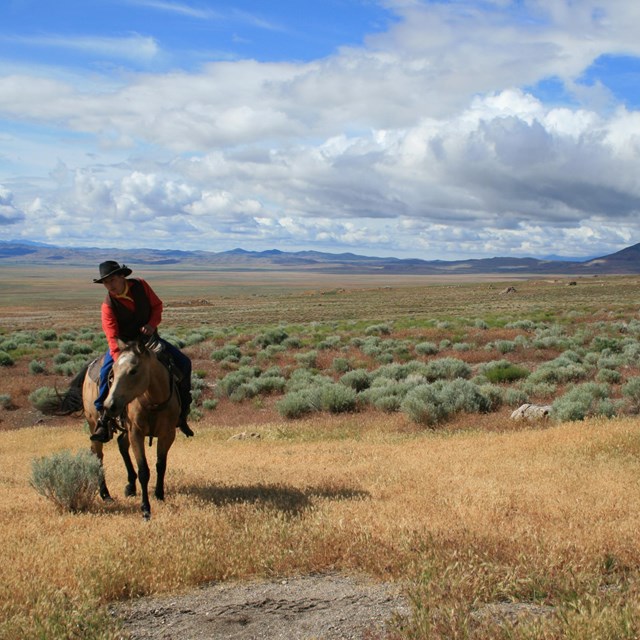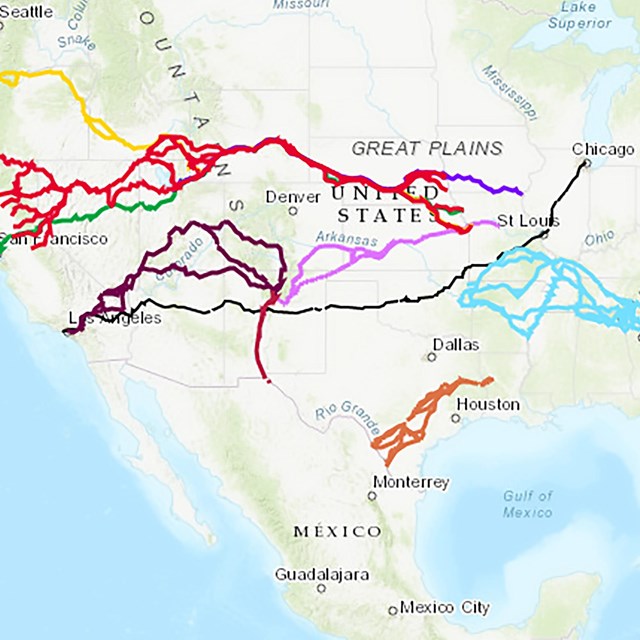Part of a series of articles titled People of the Pony Express.
Article
Melville “Mel” Baughn, the Pony Express
Melville “Mel” Baughn – Pony Express[1]
Angela Reiniche
W. F. Bailey, an early writer of Pony Express history, described its riders as the best men available in the West. They were “looked up to” and ready to “ride their beat and make their time” without regard to the time of day or night, the season of the year, the difficulty of the terrain, the challenges of the weather, and the “threats of hostiles.” Alexander Majors, a principal in the firm that operated the Pony Express, wrote that his riders were “faithful, daring fellows . . . remarkable for their lightness of weight and energy” and, above all, “skillful guides, scouts, and couriers, accustomed to adventures and hardships on the plains—men of strong wills and wonderful powers of endurance.”[2] For Melville “Mel” Baughn, who was born in Virginia, orphaned by the age of fourteen, and described by his contemporaries as a “bright, dashing youth,” the reality was more complicated. In some ways, the historical record shows Baughn to be the prototypical Pony Express rider: fearless, energetic, and resolute. In other ways, however, his story challenges this narrative.When Mel Baughn left Virginia at the age of fourteen, he moved to Franklin, Tennessee, and worked as a bartender. Frequenting the local horse races in his off time, Baughn developed a reputation for his skills as a horseman, which drew “the attention of sporting men.” His associates also recognized his penchant for whiskey drinking, which persisted despite a career change from bartender to professional horse trainer. Near the end of the 1850s, Baughn left Tennessee for Independence, Missouri, with a company of horse racers; upon their arrival, he took a job as a hostler on a large farm, training and managing the horses. He remained there for a year. Although he expressed some regret upon leaving, he provided no reasons for his departure.[3]
At some point in 1860, Mel Baughn moved to Kansas to work as Pony Express rider for the Central Overland California and Pikes Peak Express Company, which was operated by the firm of Russell, Majors, and Waddell.[4] The twenty-year-old Baughn rode between Thirty-Two-Mile Station and Fort Kearny (in what is now Nebraska). At Thirty-Two-Mile Station, Baughn enjoyed what one traveler described as a long log home station run by a “neathanded and thrifty family from Vermont”; the rooms were “cosy [sic] and clean” and “the chickens and peaches were plump.” Soldiers from Fort Kearny visited the store that adjoined the station and often informed station keeper George Comstock and Express riders about “past fights and future wars.” [5]
One story in particular, often recounted by historians and Pony Express enthusiasts, highlights Baughn’s horsemanship and the challenges that riders might face on a regular basis. One day, while resting between trips at his home station, Baughn realized that his favorite horse—the best in the stable—had gone missing. Fortunately, he noticed soon enough that he was able to pursue the bold thief. Despite riding a lesser horse, Baughn’s superior horsemanship allowed him to catch the villain at Loup Fork and force the thief to abandon the stolen animal. Baughn might have chased him down, but he had a job to do, so the unsuccessful bandit disappeared. With his horse retrieved, Baughn returned to his station, where a mail bag awaited him, and he continued his regular run without delay.[6] At the time he left, Russell, Majors, and Waddell owed him about $500. In the midst of financial failure, the firm failed to pay him. After that, Baughn found himself in “embarrassed circumstances” and eventually became a “jayhawker”—a person who committed violent raids against pro-slavery interests in Kansas Territory before and during the Civil War. Thieving may have helped Baughn relieve his financial difficulties, but he was ultimately arrested, tried, and convicted for his crimes. Although sentenced to ten years in prison, he served just two and a half years before returning to St. Joseph, Missouri, where he “became the companion of dissolute men, and became connected with a band of robbers and murderers.”[7]
After the suspension of the Pony Express in 1861, Baughn’s life took a turn for the worse. According to most contemporary accounts, including his own, Baughn led a life of crime.[8] The same penchant for thrill-seeking that had made him a legendary Pony Express rider also led the twenty-something Baughn to join a gang of horse thieves and murderers that terrorized northeast Kansas and northwestern Missouri. In his History of the State of Kansas (1883), William G. Cutler recalls the details of what he named “The Baughn Tragedy,” in which Baughn’s crew killed a prominent citizen of Seneca, Kansas. On 12 November 1866, Baughn and three other men arrived in Seneca with three stolen horses; a week later, the horse’s rightful owners appeared and—with a posse of local citizens in tow—proceeded to chase Baughn and his companions. When three of the men caught up with Baughn and one of his associates, a gunfight ensued and Baughn shot Jesse S. Dennis in the back. The bullet pierced Dennis’s lung, causing a fatal wound. Baughn escaped, and a $1000 reward was immediately issued for the delivery of his body.After successfully evading would-be captors, Baughn was arrested for the last time by Seneca Sheriff Abram Kyger on 27 June 1868. Baughn’s trial, which began on 2 August, lasted four days; the jury found him guilty of murder and the judge, R. St. Clair Graham, sentenced him to death by hanging. During his final days, Baughn asked that his wife be informed of his death and asked that a “Reverend Stewart” offer her consolation. In a letter addressed to Sheriff Kyger, Baughn wrote that his jailers had treated him with kindness, expressing gratitude for protection from “mobocracy” and “blood-thirsty disposition of a number of citizens of this county …who were ever howling for blood.” Mel Baughn’s execution took place on 18 September 1868, which at the time of Cutler’s history “was the first and last judicial execution the county [had] seen.”[9] He is buried at Barry Cemetery in Milford, Kansas.The saga of the Pony Express remains one of the American West’s most fascinating historical subjects. The legendary exploits of its riders create a romantic image of the upstanding, dutiful, and even heroic rider. Mel Baughn’s story shows that Express riders were imperfect human beings—and, in some cases, criminals.
[1] Part of a 2016–2018 collaborative project of the National Trails – National Park service and the University of New Mexico’s Department of History, “Student Experience in National Trails Historic Research: Vignettes Project” [Colorado Plateau Cooperative Ecosystem Studies Unit (CPCESU), Task Agreement P16AC00957]. This project was formulated to provide trail partners and the general public with useful biographies of less-studied trail figures—particularly African Americans, Hispanics, American Indians, women, and children.
[2] Bailey and Majors quoted in Christopher Corbett, Orphans Preferred: The Twisted Truth and Lasting Legend of the Pony Express (New York: Broadway Books, 2003), 254.
[3] P.L. Gray, Gray’s Doniphan County History: A Record of the Happenings of Half a Hundred Years (Bendena, Kan.: Roycroft Press, 1905): 59–60.
[4] William Russell, Alexander Majors, and William Waddell, all of whom had been involved in wholesale trading (Russell and Waddell) and the supply of military forts (Majors), formed a partnership after receiving a contract (1855) to supply all of the military posts west of the Mississippi River. For more on the formation on the firm of Russell, Majors, and Waddell, see “The Great Race Against Time: Birth of the Pony Express – The Firm of Russell, Majors, and Waddell,” National Park Service, 2002, https://web.archive.org/web/20080701061704/http://www.nps.gov/archive/poex/hrs/hrs2b.htm; and “The Great Race Against Time: Birth of the Pony Express – Leavenworth and Pike’s Peak Express Company,” National Park Service, 2002, https://web.archive.org/web/20080621232641/http://www.nps.gov/archive/poex/hrs/hrs2c.htm.
[5] Richard Burton quoted in William E. Hill, The Pony Express Trail: Yesterday and Today (Caldwell, Idaho: Caxton Press, 2010), 107.
[6] For iterations of Baughn’s famous chase, see Glenn D. Bradley, The Story of the Pony Express (Chicago: A. C. McClurg and Company, 1913), 108–09; and Hill, The Pony Express Trail, 108.
[7] P.L. Gray, Gray’s Doniphan County History: A Record of the Happenings of Half a Hundred Years (Bendena, Kan.: Roycroft Press, 1905): 59–60. Gray includes a “pen sketch” on Baughn and its author is listed only as “T.W.T.”
[8] From Gray’s history, it is clear that T.W.T. conversed with Baughn during the time he was jailed at Seneca, Kansas, and was present for his execution on 13 September 1868. The author of the sketch makes it a point to recount how Baughn made clear that while he could describe many crimes in which he had a part, he would not do so because his testimony would implicate well-respected members of the community. Gray, Gray’s Doniphan County History, 62-64.
[9] William G. Cutler, History of the State of Kansas (Chicago: A.T. Andreas, 1883), online edition without page numbers, in Part 4: Nemeha County, Seneca Part 1, Crimes and Criminals, http://www.kancoll.org/books/cutler/nemaha/nemaha-co-p4.html#RAILROADS.
Last updated: February 14, 2023


